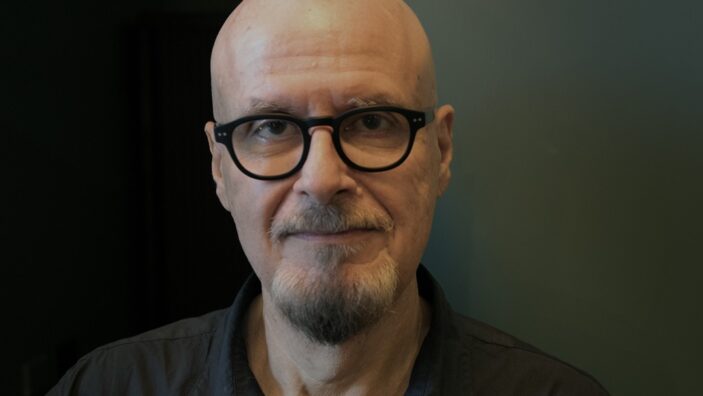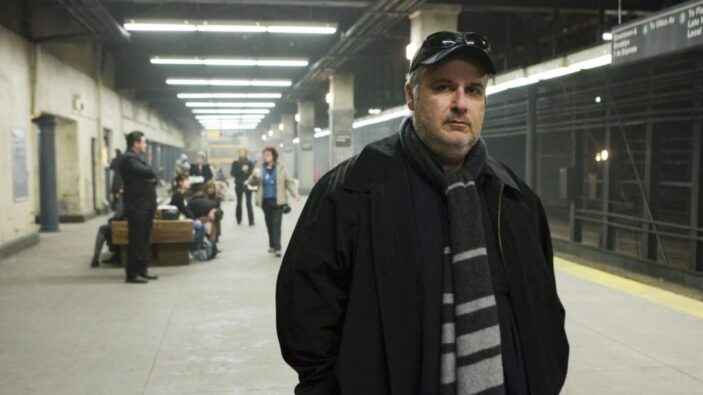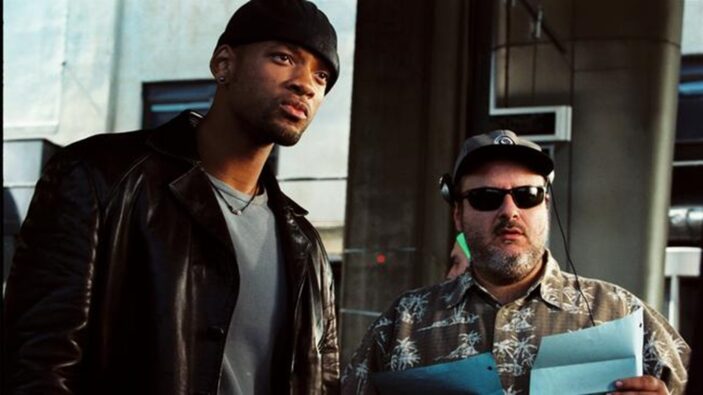
Alex Proyas has long been one of Australia’s greatest directorial exports. Biding his time between international and local fare – in the same sentence of his work you can mention 1994’s defining The Crow, the ambitious neo-noir sci-fi thriller Dark City, and the blockbuster Will Smith outing I, Robot – the filmmaker has made a name for himself within the genre space.
And whilst many assume he’s been creatively quiet since his last big screen effort – 2016’s divisive Gods of Egypt – he’s been flexing his innovative muscle with a series of short films, many of which are only being seen for the first time now.
To celebrate both his new string of projects and the accomplishments across his career thus far, the Gold Coast Film Festival awarded Proyas with the Chauvel Award as part of their Screen Industry Gala Awards, acknowledging significant contribution to the Australian Screen Industry.
As he celebrates this achievement, Peter Gray was fortunate enough to sit down with Proyas – over a cheeky beverage, no less – at the opening of the Gold Coast Film Festival to discuss his views on the changing atmosphere of the industry, AI usage in cinema, and I, Robot two decades on from its release.
The Gold Coast seems to be an ever-growing hub for filmmaking in Australia. How have you seen the Australian film industry evolve over these last few decades of your career?
You can’t put everything into the same overall shell. Like, all the big runaway Hollywood productions – yeah, great, it’s fantastic. And we’ve got the resources now, the studios, the infrastructure, to cater to the projects. But I think for our homegrown stuff, we’ve got a long way to go. We’re also fighting the very nature of a shifting landscape in filmmaking. We are all independent filmmakers in this country, right? Unlike Hollywood, they have day jobs in the film industry. Here, we do it as a hobby. We get paid, and we’re very happy. And I do think we need to do a lot better here at helping homegrown talent.
I have an interesting experience, because I’ve done both very small budget films locally here, and the big Hollywood films. And I know I get enormous support when I’m brining $80 million US into the country, right? No so much when I’m not doing that. I think that’s a real problem. I think we need to keep working diligently in fixing that problem. Filmmakers need – Australian filmmakers – need all the support we can get. Even more so because it’s such a precarious industry globally, but here we feel the brunt of that much more so than perhaps others.
Because you have made films both locally and internationally, how did you find navigating the international studio system?
It’s horses for courses. Making movies is never easy. It doesn’t matter what level you’re doing it and who you’re doing it with, it’s always a slog. That’s why I say support it the way to do it. That goes for fellow filmmakers. I make an effort to never say anything bad about anyone else’s film, because I think any film being made is a miracle. We should support each other.
That’s something the American’s actually do pretty well, because they’re all trying to make money out of it, right? Here, we don’t do that so well. The Australian psyche is one where we’re always kind of scared of other people, we’re scared of competition. We see people as competition, which we’re not. Rival filmmakers are not competition. We’re fellow artists all trying to do something fun. So, I think supporting each other as much as we possibly can, I think that’s really important. That’s the Australian psyche.
I equate it to when someone opens an Italian restaurant, and they have a business that appeals to people who want Italian food. And then another person opens up a rival Italian restaurant across the street. The first guy gets really pissed off and thinks it’s competition. What they don’t realise is that they’re not competition It’s the birth of a Little Italy. It means more people are going to come and get Italian food. It’s good for everyone.
That’s something that Australian’s inherently don’t understand. It’s something that Americans, as a culture, they understand this notion of making sequels, making franchises, doing all that stuff. It’s an extension of the same idea. If more people are doing more of the good thing, that’s great.
I think it’s a psychological problem. Bono had a great story to tell. And I don’t like Bono. I don’t like his politics or whatever, nor do I like his music particularly, but he had a great story to tell – In America, if you’re not making a lot of money, you look up to the rich man’s house on the hill and go, “One day, I’m going to be so rich, I’m going to own a house like that guy!” In Ireland, you look up at the rich man’s house on the hill and you go, “Well, I’m going to go up there and fucking kill that rich guy and steal his fucking castle!” And to a certain extent, that’s the Australian psychology too.
It’s shifted a little bit over the course of the decade, sure. But we still try and hold people back in our own industry, because they’re perceived as competition, and rivals, which we’re just not.

You’re here on the Gold Coast as you’re a recipient of this year’s Screen Industry Gala Awards where you’re the Chauvel Award recipient. Congratulations.
Thank you. It’s a great honour. I’m in very good company with the people that have won it in the past.
And you’re showcasing your recent short films here…
The short films came about because I wanted to show people something they maybe hadn’t seen. I’ve been making short films and experimenting with different techniques and stuff. I’m most proud of my recent stuff. It’s been worth it. No one has told me what to do and what to change! I’ve paid for it all myself, which isn’t the best feeling!
That’s the price of creative freedom, right?
Honestly, for the fun I’ve had making these films, it was worth it. It’s great that they’re (Gold Coast Film Festival) open to showing this sort of stuff, because to me it’s all about the future. What does it look like? Where are we taking all of this? That’s what I’m most excited to talk about. What do we have to change to fix the broken model? How do you shift that? How do we change that? How do we make sure we increase income and revitalise the ability for independent filmmakers to earn a living doing this?
And I’m not saying by going to work on some big Hollywood movie as a crew member. I’m talking about spearheading this creative venture. It’s really, really important to start to talk about where we’re going to take this thing. It’s all about change. We’ve got to change this. It’s just not working for anyone. Pointing the finger at things like AI, that’s not it. That’s a new possibility. That’s not the Armageddon facing the film industry. AI isn’t responsible for that. Maybe it’s a tool to actually save the industry from that. We have to talk about it. We can’t ignore it and hope it goes away. Sure, we have to legislate it. But it’s not going away. We have to make it ethical.
There are two arguments about AI. One is taking people’s work away. If Marvel is doing it, it’s taking people’s work away and they should be severely punished. If it’s independent filmmakers, making a film that they would otherwise not be able to make in any other way, then it’s a beautiful new opportunity for a whole new art form. I don’t accept the argument that it’s plagiarism. You don’t need AI to be a plagiarist! I’ve been plagiarised many times. It’s human beings.
And the AI arguments come from a place of fear. They’re not coming from a place of seeing the opportunity that emerges from this technology. With my career, we’re working on AI projects at the moment, and we’re taking active measure to make sure we don’t steal ideas from others. It’s been quite interesting.
On that subject, it’s the 20th anniversary of I, Robot this year. What was the experience like of making that film? And how do you think it’s held up 20 years later?
We were actually talking about this today, and it was a very prescient kind of project. We had some MIT professors and students helping us with the development of technologies in that film. And this was around (the year0 2000, and we said we were setting the film in the 2030-something, do you believe that the robots we’ve designed and developed will be a realistic projection?
And they thought – maybe? I thought we were being conservative! Actually, two of the guys are actually now principal scientists at Boston Dynamics. So, the robots aren’t just there yet, but it’s getting pretty close.
But it was a horrible experience because the studio was terrible to work with. I got away with most of what I wanted to write. I mean, I wanted it to be more deep and meaningful. Will (Smith) was great. He was always very supportive of the serious approach to what we were doing. The studio kept saying to both of us that they wanted more gags. They kept insisting on it.
So, eventually, we said we would do it, and we would do one take that was more serious, then one take with a one liner. They accepted that which basically meant I did get to make my version of the movie, but it also meant we had to test the studios version of the movie with the gags, and their movie tested through the roof.
It was the best test Fox had ever had. It scored 96 in the top two boxes. The last one to score that high was Ridley Scott’s Gladiator, and that only got a 92. And I said to Will, “Well, looks like they’re doing the funny version”. We didn’t have a hope in hell then. We tried to test my version to at least to see how it tests, and they wouldn’t let me. And by that point we had a release date and wouldn’t have had time to cut my version. I didn’t have final cut on that movie.

Do you feel like the work you’re doing now with the short films and self-financed projects is potentially an extension of the things you wanted to do and say in those films back then?
It’s a bit like psychoanalysing yourself. I mean, everything I do has got my “stuff” in it. It doesn’t matter whether the studio pushes back or not, it’s still somewhat my stuff. I think that’s what I’m trying to do with these movies, not just making entertainment. I’m trying to make a philosophical piece that also entertains. I hate audiences being bored and thinking, “God, this is fucking pretentious bullshit”. It’s about how cleverly you can hide it from a mainstream audience.
At the end of the day, I make movies for me. Gods of Egypt? I made that movie for 12-year-old me, when I first saw Star Wars. Like with I, Robot, I saw Star Wars 20 times growing up. It’s not for every 12-year-old boy or girl in the world, but it was for 12-year-old me. When I made The Crow, I made that for 18-year-old me because he was allowed to see that sort of movie.
I don’t care about the 25-year-old women. I don’t care about 50-year-old men. I don’t care about 10-year-old girls. I’m making them for one person who loves industrial music, who loves the Gothic style, and violence, and mayhem. If every movie was made for everyone, you’re going to fuck it up for 18-year-old me. And then maybe my work will find others who like it too.
On that mention of The Crow too, do you feel that mentality of not necessarily making the movie for someone specific the way you did is where those sequels went wrong?
Yeah. What I’m doing now with my films, films that have no commercial requirement, is I’m trying to distil what it is that I want in a film at my age, which is 60. My tastes have changed. They’ve shifted. So, I’m thinking, “If it doesn’t appeal to anyone other than me, I don’t give a shit.” There’s a lot of people my age, and maybe a bit younger still, who liked (those films). I don’t care.
I believe I’m more sophisticated, but I’m really not getting back to any sort of sweet spot, which is maybe my mid-20s. Right? The films I liked at that age were by Andrei Tarkovsky and David Lynch. You wouldn’t call them a commercial format. I guess if I was going to make a parallel, that’s the type of things I would want to make. But that’s not my next feature. The next feature is not appealing to that audience. I don’t even know who it’s appealing to.
The Chauvel Awards, in conjunction with the Screen Industry Gala Awards is a celebration as part of this year’s Gold Coast Film Festival, which is running between April 17th – 28th, 2024. My thanks to PJ Marketing and the Gold Coast Film Festival for facilitating this interview.
